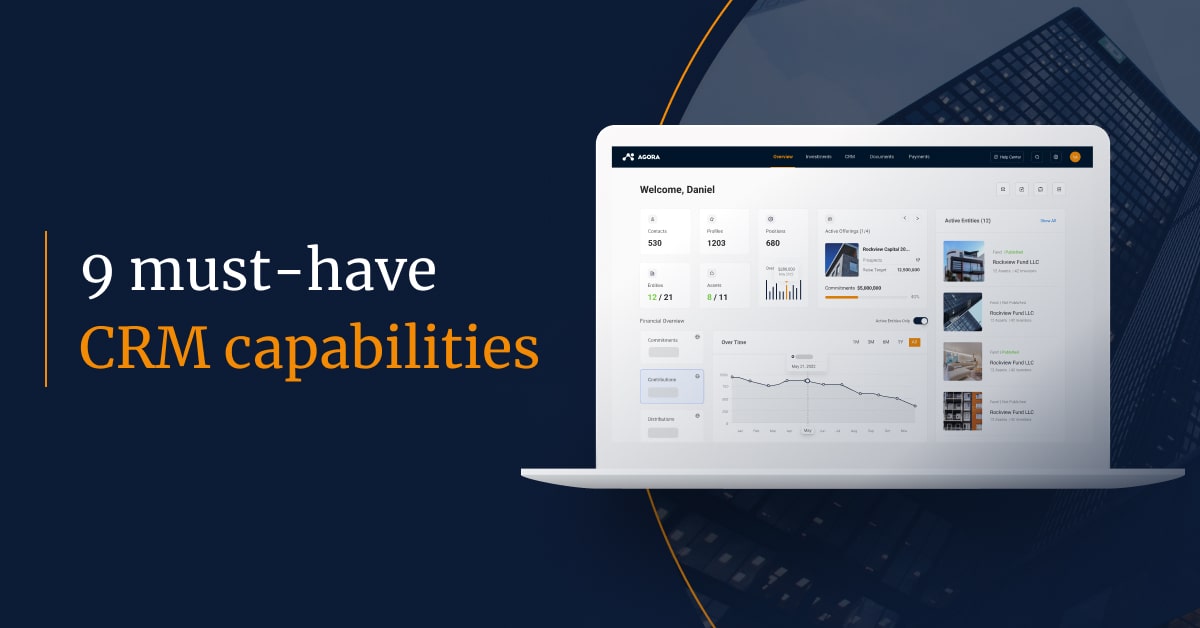Are you in the market for a an investor relations management software (also called investor CRM)?
There are substantial differences in capabilities, features, and overall quality between the CRM software solutions for real estate firms.
That’s why we compiled this short checklist to help you make the best decision.
But First, to know more about investor CRM and why it’s so crucial for investor relations, you can read our article.
Here are the nine most important features and capabilities for real estate investor CRM software:
Tailor-made for real estate investor relations
Generic CRMs provide the ability to manage relations with leads, clients, or any other type of contacts.
They usually provide basic capabilities like:
- Assigning contact information like addresses, emails and phone numbers.
- The ability to assign tasks, track leads and keep track of conversations.
Unlike generic CRM, a real estate investor CRM is specifically designed to manage real estate investor relations.
That’s why it’s built from the ground up to accommodate actions and needs that generic CRM software solutions don’t offer. For example, the ability to:
- Create dynamic lists (of investors or leads) based on real-estate-specific filters like investor type, prior investment amount, preferred investment type (multifamily, retail, industrial, etc.), and more.
- Create and send investor statements and reports through the CRM.
- Send signature requests for subscription documents and track their completion status.
- View commitments, contributions, and distributions for each investor.
- Manage and track the different investments associated with each investor account.
- Classify, assign, and search documents by type (e.g., distribution notice and capital call notices, investor statements, and agreements), and control their visibility to the investors.
- Add different profiles for each investor if they invest with different legal entities (personal, LLC, partnership, etc.)
Investor Portal software
Investor portal software is essential for any real estate firm’s investor CRM software. The Investor Portal is essentially the storefront of your CRM operations.
That’s why no CRM is complete without an Investor Portal. Through the portal, investors can log in and view their investment information, track performance, review documents, and communicate.
An Investor Portal not only gives investors better transparency and more control over their information. It also frees them from depending on the real estate firm for information.
On the other hand, The firm saves valuable resources that are otherwise spent on handling investor requests and providing information.
Additionally, a real estate Investor Portal helps boost the fundraising process by providing investors with:
- New investment opportunities.
- Access to deal data rooms and brochures.
- The opportunity to make soft commitments.
- A Quick and easy subscription process.
Inbound leads manager
Another essential feature is an inbound leads manager – where firms can track and manage their inbound leads. They can add attributes to each prospective lead, like:
- Lead priority.
- Accreditation status.
- Preferred strategy, risk, and investment vehicle type for that lead.
Email tracking and analytics
Sending emails from within the CRM platform is a basic feature that many, if not most, CRM software solutions provide.
However, not all CRM software solutions enable you to get email delivery stats and track your email success rates.
With email tracking, you should be able to view your email’s delivery, open, and bounce rate.
You should also see all the recipients who didn’t open or receive the email and reach out to them individually.
With email tracking and analytics, you can reduce the chance of miscommunication to zero.
Dynamic lists
We touched on dynamic lists briefly before, but it’s a feature so important that it deserves some attention on its own.
A dynamic list is a list that is based on certain criteria and changes automatically according to that criteria.
Meaning, the investors, leads, or contact on the list are not set but rather change automatically according to the criteria.
For example, You want certain deals to only be open to investors with at least three prior investments, with a total of over $1 million in contributions.
From the moment you create the list moving forward, any investor who qualifies will automatically be added to the list, so it will always be up-to-date.
Dynamic lists are helpful in every aspect of investment management. They are useful for fundraising and lead generation.
Dynamic lists are an essential tool to manage leads better, concentrate your marketing and fundraising efforts and increase efficiency.
Document Management
A document manager is crucial in real estate firm investor CRM. We’re not talking merely about document storage, like a cloud drive or a set of folders, but more importantly, having better control and access to the documents, such as the ability to:
- classify the documents based on their type (agreements, Schedule K-1s, capital calls, reports, notices, etc.)
- Assign documents or document groups to specific investors, investments, or entities.
- Filter, sort, and search documents based on their attributes.
Part of a holistic solution
A stand-alone investor CRM isn’t a sufficient solution to manage real estate investor relations.
To optimize your investor relationship, it has to be part of a holistic platform that also provides, among other things:
- An Investor Portal (as we mentioned before).
- Tax reporting features.
- Fundraising enablements and automation tools, like customizable data rooms, brochures, and subscription flows.
- Distribution payments via ACH transfers.
Data security
It goes without saying that financial information must be safeguarded by the most advanced security measures.
Look for the ISO/IEC 27001 information security certification, and ensure the portal login is secured by a 2-step authentication process.
Research reviews (not a feature, but important nevertheless)
Transferring your investment operations onto a new investor management software is a big decision. It should be based on knowledge of real user experience with the software, service, and customer support.
The best way to determine if the CRM delivers on its promise is through customer review websites like G2.
See how Agora compares
Agora’s real estate CRM is part of a comprehensive investment management solution that covers all the investment needs of real estate firms, GPs, and syndicators.











